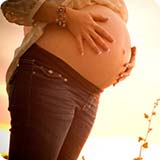Pregnancy
It is important to supplement vitamin B12, in addition to folic acid, during pregnancy. Folic acid and vitamin B12 use each other to function in the body. If you only take folic acid, without supplementing vitamin B12, the level of B12 in your body will decrease. This may cause a vitamin B12 deficiency, especially during pregnancy when your body is already using extra vitamin B12. Therefore, always supplement vitamin B12 in combination with folic acid during pregnancy.
Fertility
A poor vitamin B12 status can make it harder to become pregnant. A severe vitamin B12 deficiency can cause repeated miscarriages. 1 2 In men, an insufficient B12 level causes a decline in the number and in the mobility of sperm cells. 3 Next to this, a vitamin B12 deficiency in men can cause impotence and erectile dysfunction. 2
Before the pregnancy
It is recommended to start folic acid supplementation before conception. This is because it reduces the chance of spina bifida, neural tube defects, a cleft lip and a cleft palate. If you start taking folic acid before the pregnancy, always supplement vitamin B12 as well. This ensures there will be no deficiency in either substance.
During pregnancy
During pregnancy, the body uses more vitamin B12. This increases the chance of a vitamin B12 deficiency.
It has been shown that inadequate B12 during pregnancy is associated with adverse outcomes.
It increases the chance of neural tube defects, preterm births, intrauterine growth-retardation, recurrent miscarriages and development delay of the brain of the foetus.
4
5
6
7
8
9
10
Symptoms such as exhaustion, tingling, memory loss, depression and nausea are often seen as ‘typical pregnancy complaints’.
But they can also be caused by a vitamin B12 deficiency:
many pregnant women are at times nauseous or suffer from headaches or forgetfulness.
Symptoms such as tingling in the hands and feet are not always mentioned.
But when I ask someone, who is part of the risk group, about it, they’ll say:
“now that you mention it, yes, I do have that!”.
These are typical symptoms of vitamin B12 deficiency.
11
Always supplement vitamin B12 and folic acid during pregnancy.
Breastfeeding
Vitamin B12 and folic acid are passed on through breast milk. During the period of breastfeeding, the body uses more vitamin B12 and folic acid. It is important to supplement vitamin B12 and folic acid while breastfeeding, to ensure that no deficiency will develop during this period of increased consumption.
Baby
Babies can also suffer from vitamin B12 deficiency. Recognisable symptoms are:
Poor feeding, suckling difficulties, delayed growth, failure to thrive, irritability, speech and language problems, trouble making contact, gait abnormality (ataxia),
low muscle tone (hypotonic/floppy baby), delayed development, macrocytosis (formation of enlarged red blood cells)
anaemia (lowered haemoglobin levels), paleness, infections and
elevated RDW (red cell distribution width: in certain kinds of anaemia, there is a large variation in red blood cell sizes. In that case, RDW has increased.)
12 20
There is an increased risk of a vitamin B12 deficiency in children whose mothers have insufficient levels of B12. A B12 deficiency in the child can be a hereditary condition.
Conclusion
Always use vitamin B12 and folic acid, before conception, during pregnancy and while breastfeeding. Keep a close eye on symptoms of a vitamin B12 deficiency in you and your child.
Recommended package during pregnancy
The Standard Package ensures optimal supplementation of folic acid and active vitamin B12. The standard packages include 600mcg of folic acid, 3000mcg of active vitamin B12 methylcobalamin and 3000mcg of active vitamin B12 adenosylcobalamin.
It is recommended to use this package before and during pregnancy and while breastfeeding. Daily take one melting tablet of both forms of vitamin B12.
Advantages of Active Vitamin B12
The advantage of active vitamin B12 (methylcobalamin and adenosylcobalamin) is that it does not need to be converted in the body in order to work. This means you can be sure that your body is absorbing vitamin B12 and it is working.
Recommended literature
Chapter 6: Lost children: When B12 deficiency causes developmental disabilities or learning problems
Chapter 9: Can’t conceive? How B12 deficiency contributes to male and female infertility
Pregnancy: 20+ Cases, research and stories of experience
“Could it be B12?” Sally M. Pacholok and Jeffrey M. Stuart. ISBN 978-18-84-9956-99
Uterus
A vitamin B12 deficiency can cause blood abnormalities.
These blood abnormalities can affect the uterus and the cervix, which may cause abnormal cell growth (dysplasia).
This can mistakenly be diagnosed as an early stage of cervix cancer.16
Preeclampsia
A vitamin B12 deficiency leads to a high level of homocysteine. Homocysteine is comparable to cholesterol. A high level of homocysteine in a pregnant woman is an important risk factor for preeclampsia (a pregnancy complication characterized by high blood pressure).17 18
Note
Even if a pregnant woman has appropriate levels of B12, damage to the brain of the foetus can occur because the baby can get a vitamin B12 deficiency. This is because only newly taken vitamin B12 is transferred to the placenta.14
Symptoms
List of symptoms caused by a vitamin B12-deficiency in babies and children.
Microwave
Both breastfeeding and bottle-feeding mothers should be warned about using a microwave to heat milk, formula, or baby food, as microwaving partially destroys the B12 in milk and meat.19
Postnatal depression
A vitamin B12 deficiency can cause a postnatal depression.13
Infantile colic
Mothers of babies who suffer from infantile colic often have had low vitamin B12 levels during pregnancy. 15


